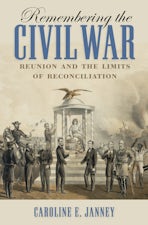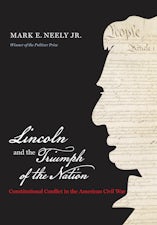With Malice toward Some
Treason and Loyalty in the Civil War Era
By William A. Blair
432 pp., 6.125 x 9.25, appends., notes, bibl., index
-
Paperback ISBN: 978-1-4696-5209-2
Published: February 2019 -
Hardcover ISBN: 978-1-4696-1405-2
Published: June 2014 -
E-book EPUB ISBN: 978-1-4696-1406-9
Published: June 2014 -
E-book PDF ISBN: 979-8-8908-7027-8
Published: June 2014
Littlefield History of the Civil War Era
Buy this Book
- Paperback $36.95
- Hardcover $42.00
- E-Book $19.99
For Professors:
Free E-Exam Copies
Awards & distinctions
Finalist, 2015 Gilder Lehrman Lincoln Prize
Establishing how treason was defined not just by the Lincoln administration, Congress, and the courts but also by the general public, Blair reveals the surprising implications for North and South alike.
About the Author
William A. Blair, Walter L. and Helen P. Ferree Professor of Middle American History at the Pennsylvania State University, serves as director of the Richards Civil War Era Center and as Founding Editor of the Journal of the Civil War Era.
For more information about William A. Blair, visit
the
Author
Page.
Reviews
“This book is not only a great reference for any Civil War Historian to have on their shelf, but it is a great explanation for those who have been confused about the legal status of treason and the ways in which it was combated during the Civil War.”--Gettysburg Chronicle
“In this wide-ranging book. . . one of Blair’s great accomplishments [is] that he can effectively consider the issue [of treason] on so many levels, making this both a sophisticated and fascinating study of the effort to define and stamp out disloyalty in the Civil War era.”--America’s Civil War
"Blair found that local residents played a large role in influencing [treason] charges and arrests."--Publishers Weekly
"For anyone with an interest in how northerners--including all three branches of government, military officers, clergy, the press, and average citizens--constructed notions of treason, this important book should not be missed."--Civil War Monitor
“Markedly improve[s] our understanding of the politics and policing of treason. . . . [This] wise and timely book offers fresh ways to think about persistently relevant questions.”--North Carolina Historical Review
"[Lays] the foundation for future studies of treason and disloyalty in the Civil War era and beyond." --American Historical Review
Multimedia & Links
Watch: Author interview with The Civil War Monitor (11/7/2014, running time 30:57)



